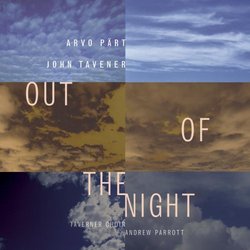Immaculate
Mark Swinton | 01/19/2000
(5 out of 5 stars)
"On this disc, directed ably by Andrew Parrott, the Taverner Choir produces a really strong performance of works by two of the leading names in contemporary sacred music- Arvo Part and Sir John Tavener. Their starting point is most intriguing- according to the notes, they aim to demonstrate that Tavener and Part couldn't be more different, although past reviewers (myself included) have been of the opinion that there's no telling their music apart. The title work, "Out of the Night" by Tavener, is a short but characteristic "dawn greeting" ceremony for viola and tenor soli, and somewhat oddly it is heard four times on the disc- suggesting that the disc ought really to be played as a whole rather than in bits, although there's nothing to stop you.... Also of interest by Tavener are his "Ikon of the Nativity", a beautiful Christmas work that is everything you would come to expect from him; and "Canticle of the Mother of God", which dates from one year before his conversion to Orthodoxy and sounds, if anything else, like late Stravinsky (hence he reaches forward and backward in a very rich piece of music that may take some getting used to by casual listeners). Part is also well-represented, opening the disc with his own unusual take on the canticle of the Mother of God and continuing after the first "Out of the Night" track with "Seven Magnificat Antiphons" and "Fratres", in which three outstanding cellists give a compelling performance. Indeed, the one thing that stands out about this disc is the performance. Parrott clearly knows what makes these composers tick, and milks some absolutely breathtaking singing from his choir (particularly in the Part "Antiphons", which in my opinion have never sounded as good on record as this). This CD is a must-have if you like either of these distinguished composers; if you seek an introduction to them, you could do worse than to get this. One of the finest releases of the new year- highly recommended!"


 Track Listings (16) - Disc #1
Track Listings (16) - Disc #1